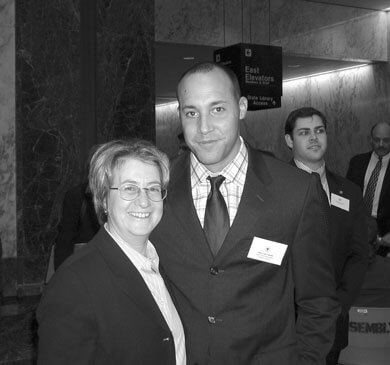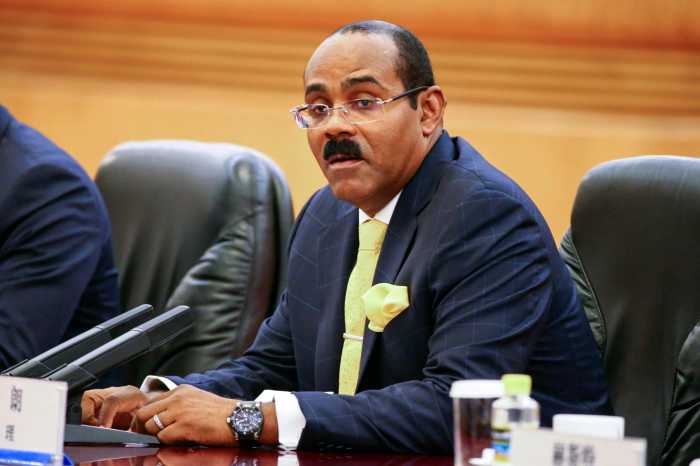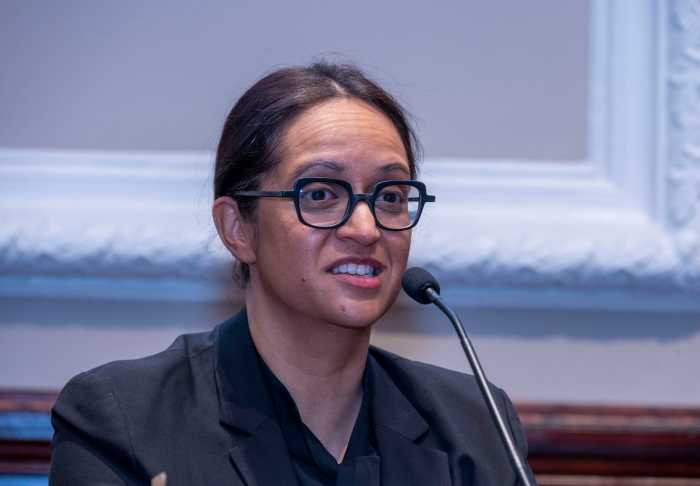Deborah Glick proposal would establish civil unions as only option for gays, straights
Civil marriage in New York would be abolished, and replaced by civil unions for all, whether gay or straight couples, under a bill to be introduced shortly by New York Assembymember Deborah Glick (D-Greenwich Village).
Some advocates working for marriage equality are troubled by the measure and call it “confusing.” Others, however, see it as just one more option for protecting lesbian, gay, bisexual, and transgendered families.
“Marriage comes with a whole lot of baggage and has a negative history for women in particular,” said Glick, the first out gay or lesbian person elected to the New York State Legislature (in 1991).
Her measure, she said, is being offered “clearly through the prism of my own feminist experience. I will do all that I can to advance this, but I’m not opposed to people pursuing or winning in court the right to marry. But it is not something that personally appeals to me or resonates in my experience.”
Glick said many of her friends “don’t want to ape a heterosexual cultural model, but they want the rights and responsibilities.” She also said she is concerned that “the line is being blurred between church and state” in the current debate over same-sex marriage. Religious agents would play no role in legalizing civil unions under her bill, but could continue to perform religious marriages for their congregants as they always have. At present, certified religious leaders are among those who can marry couples after they have obtained a license from the state. Some couples just have civil marriage ceremonies.
Glick’s bill would go through the domestic relations law, striking the word “marriage,” and substituting “civil union” in every instance. If passed, it would be the only option for same-sex and straight couples to unite.
“To some extent,” she said, “it is a little bit more radical” than fighting for same-sex marriage, “telling the straight community that the state is going to get out of marriage and into civil unions.”
Glick’s proposal is not novel and has been floated by newspaper columnists and activists around the country. But she is the first legislator in the nation to introduce such a measure.
“I think it’s bad timing,” said David Thompson, co-chair of Marriage Equality/New York. “I think it will confuse the issue and don’t think it has any better chance of passing than the Right to Marry Bill in Albany. I think those who represent us would do better to focus on the issue of marriage equality because it is being taken seriously now in New York State as a legal and political option on a level that we have never seen before.”
Glick did not subject her bill to any open community forum, but Ross Levi, director of public policy and governmental affairs for the Empire State Pride Agenda (ESPA), said that his group was aware of it.
“It will be on the list of bills that we are advocating on,” he said by telephone from Albany. “We’re not tied to any one way. We’d like to have the opportunity to marry, but that should be a choice.”
Assemblymember Dick Gottfried (D-Chelsea), chief sponsor of the Right to Marry Bill, said, “I don’t see what problem the bill solves. And I’d be concerned about the straight community saying, ‘They’re out to destroy marriage just like everybody thought.’ I don’t think it overcomes the obstacles to marriage equality and invites a line of argument that is not helpful. For bigots who don’t want to be put in the same class as lesbian or gay couples, it doesn’t solve anything.”
Gottfried added, “I really believe that same-sex marriage will come about because of people who believe in marriage and believe that lesbian and gay couples have a right to be a part of that institution. I don’t think we’re going to get there by trying to convince people that government should get out of the marriage business. That’s a bigger mountain to get over.”
State Sen. Tom Duane (D-West Side), who is gay and a lead sponsor of the marriage measure in his chamber, did not return a call for comment on Glick’s bill.
One of Glick’s co-sponsors is out Assemblymember Danny O’Donnell (D-West Side), who said, “This came about as the result of a long personal conversation with Deborah,” but he emphasized it is her bill.
“I am a happy passenger,” he said. “If the government is going to recognize a relationship, is the word ‘marriage’ important? One of the things this bill is useful in doing is putting forth the idea that there is a difference between what the government does and what the church does,” a distinction that is clearer in Europe. In France, for example, all couples are married in civil ceremonies, with some electing to have a second, religious service as well.
As to the problems that might arise for couples who obtain a civil union in New York when they travel or more outside the state, O’Donnell said he doesn’t think it will be a problem for straight couples, but it is “a more politically complicated question for gay couples.”
Jesus Lebron, a founder of Marriage Equality and now co-chair of the Civil Marriage Trail, which has worked to help couples interested in marrying in Canada and Massachusetts, thinks the bill will “undermine our efforts toward marriage. Legislators know marriage will remain with us. Let’s get on the bus for marriage, not off it.”
Brendan Fay, who along with Lebron, has led groups of couples to Toronto, and married his spouse Tom Moulton there, called Glick’s bill “ridiculous.”
Saying, “Marriage is an important institution for us and our families,” Fay promised he will continue to work for the Right to Marry Bill, a bill that Glick says she supports as well.
Evan Wolfson, director of Freedom to Marry, said of Glick’s bill, “Our goal is to secure equal rights and choices for all New Yorkers without discrimination, including the right to marry. Marriage is a legal institution under current law and government should not be discriminating in who can take part. It is good to engage people in a discussion about the difference between the legal rights and religious rites of marriage, but no new bill is needed to end discrimination in the existing legal institution of marriage.” Indeed, a lawsuit filed on behalf of ten upstate Nyack couples, including Mayor John Shields and his partner, seeking same-sex marriage rights asserts that the state’s domestic relations law is gender-neutral and, therefore, gay people already have the right to marry. Another lawsuit, filed by Lambda Legal, on behalf of a Manhattan couple, argues that denying same-sex couples marriage rights violates the state’s constitutional rights of equal protection and privacy.
As radical as Glick’s proposal may sound, those who obtain civil unions will be bound by all the rights and responsibilities currently in the marriage law. Is it just a change in the name?
“Lots of things start in one place,” she said. “It eliminates the religious connotations in the law. Lots of things we do legally in legislation have other ramifications that take time to percolate.”
Doesn’t it continue to privilege couples over singles?
“Some suggest that,” she said. “I’m approaching it from the point of view that same-sex couples are disadvantaged in a number of ways.”
Feminist legend Gloria Steinem, who just turned 70, said in Time magazine this week, that same-sex marriage “is a women’s issue. The idea that sexuality is only OK if it ends in reproduction oppresses women whose health depends on separating sexuality from reproduction as well as gay men and lesbians. Bush and the right wing have overreached. Even people who oppose same-sex marriage don’t want a constitutional amendment.”
In contrast, feminist writer Viviane Lerner recently wrote, “Although I’ll support any day the right for gays to the concrete benefits of civil marriage… it kind of makes me laugh that I do. I really think that, by and (very) large, marriage has little, if anything, to offer women.”
Even as gay and lesbian advocates pursue a number of approaches for protecting LGBT families in New York, there are signs that opposition is also intensifying. Early last month, Senate Majority Leader Joseph Bruno, a Republican, indicated that he is looking at taking up a state defense of marriage bill.
“We are looking at defining marriage following President Clinton’s guidelines,” he told the Associated Press. “We are looking at a way to clarify the confusion out there.
Duane last week said that Assembly Speaker Sheldon Silver (D-Lower East Side) assured him that the Democratic conference will not allow a state DOMA to be brought to the floor. New York is one of 12 states that does not explicitly ban same-sex marriage. At a March forum on same-sex marriage held at the LGBT Community Center, Glick and O’Donnell said they had received similar assurances from Silver, though both said nobody could predict what might happen if someone were to add a DOMA amendment to another piece of legislation.
Gottfried told Gay City News, “I haven’t spoken personally to Shelly on this because I know where he stands. There is no interest in doing anti-marriage activity and his sense of what the majority wants is for neither bill to be on the floor at this point.”
Could that change if a court rules that gay couples can marry here?
“I would expect the Assembly to refuse to do anything that would undermine such a decision,” Gotttfried said.
If the courts interpret the state Constitution to allow gay couples to marry, amending the Constitution would be similar to the same process currently underway in Massachusetts. Two successive sessions of the Legislature would have to approve an amendment before it would go on the ballot, unless voters successfully petition for a state constitutional convention, at which time a ballot question could also be approved.
Levi of the Pride Agenda said his group has just completed the sixth of ten town meetings planned around the state on the issue of same-sex marriage. A meeting held March 25 in Nyack drew 175 people.
“The main thing we want is for the Legislature to do no harm,” Levi said. “The LGBT community is overly complacent about the prospects of a negative bill [such as a DOMA]. We better be aware that it would be a major victory to get out of session without a negative bill.”


































